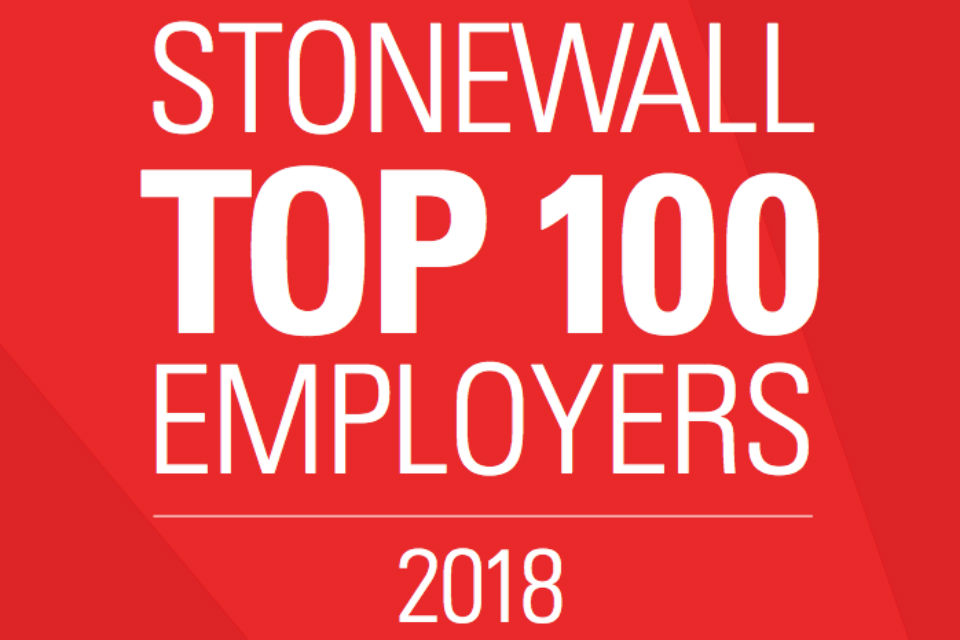
At a large private sector company in 2006, I asked one of my few ‘out’ senior LGBTQI colleagues her views about setting up a LGBTQI staff network for the business. Her response? “Absolutely not. I don’t think we are in that place yet.”
That wasn’t unusual at the time. Workplace inclusion wasn’t something that was talked about - a reason I jumped ship to the public sector. I wanted to make a difference and use my experience as a gay woman, and the insight it brings, to encourage change.
Fourteen years ago, Stonewall introduced an annual list of its Top 100 Employers - a definitive list showcasing the best employers for LGBT staff, compiled from submissions to the Workplace Equality Index (WEI), a powerful benchmarking tool used by employers to create inclusive workplaces.
In the first few years, government departments and agencies performed well. However, as the list gained momentum, the private, voluntary, higher education and wider public sectors caught up. They realised that inclusive culture and diverse workforces are critical to attracting and retaining talent, and to ensuring effective and responsible business and service delivery. Government continued to feature, with the Home Office a star performer, and some smaller agencies consistently doing well. But in recent years departments weren’t as well represented.
 This year the Ministry of Justice features in the Top 100 for the first time in eight years. We are now ranked at 13 - the highest position for a government department, above the Home Office (38th) and Education (78th) - having jumped an astonishing 101 places from 114 in 2017 and 191 places from 204 in 2016. (Other government bodies in the rankings include the National Assembly for Wales (which tops the list), the Welsh Government (12th), the Crown Office and Procurator Fiscal Service (15th), the Environment Agency (18th), the House of Commons (23rd), and the Intellectual Property Office (=93rd).)
This year the Ministry of Justice features in the Top 100 for the first time in eight years. We are now ranked at 13 - the highest position for a government department, above the Home Office (38th) and Education (78th) - having jumped an astonishing 101 places from 114 in 2017 and 191 places from 204 in 2016. (Other government bodies in the rankings include the National Assembly for Wales (which tops the list), the Welsh Government (12th), the Crown Office and Procurator Fiscal Service (15th), the Environment Agency (18th), the House of Commons (23rd), and the Intellectual Property Office (=93rd).)
An MoJ colleague in HM Prison and Probation Service (HMPPS), Supervising Officer Andy Holmes from HMP Stafford, was named Ally of the Year for his tireless work leading LGBTQI awareness sessions. To date, he has reached almost 1,000 prisoners and 2,500 staff. Both our LGBQTI networks, Spirit and PiPP (Pride in Prison and Probation), have been awarded the 'Highly Commended Network Group' accolade.
So how did we do it, and what practical advice can we offer?
1. Get feedback – analyse LGBTQI responses to the annual Civil Service People Survey and consult with your staff and stakeholders to understand where you need to make improvements the LGBTQI experience. We use this feedback for our Stonewall submission as well as our action plans for LGBTQI equality. Each year we have pulled together a detailed action plan and strategy setting out where we need to do more work, improve policies or processes or do targeted engagement to reach those who may not have a voice or be disengaged.
2. Get the basics right – you can hold as many events as you like and seek opportunities for promotion of LGBTQI issues, but unless you get the basics right in terms of your workplace policies and practices, can you truly say you are being inclusive? In the past two years, we’ve introduced policy guidance for all staff on LGBTQI issues, such as: supporting staff undergoing gender reassignment; guidelines for challenging inappropriate behaviour; resources for training and development, and for aligning diversity and inclusion; and including participation in staff networks in personal objectives.
3. Make contacts in the business – relationship building has been key to our success. You need to make things happen and you need support from various parts of the business to enable that. And where you may face barriers, don’t be afraid to challenge and bring in senior support if needed. Our senior LGBTQI champions played a great part in assisting our journey. Understand who makes the decisions in all the areas where you need to improve and build those relationships, whether that’s HR, procurement, communications, policy, finance, etc.
4. Consider the bigger picture – it’s not just our internal practices that matter, but how does our work impact on the wider LGBTQI community? Parts of our submission focused on the work we are doing to support LGBTQI offenders in HMPPS; how we are ensuring equality for LGBTQI people within the law; and the support we provide for LGBTQI victims and witnesses of crime and their families. Get to know your operational delivery and your policies and how LGBTQI inclusion fits into that. And ensure that your LGBTQI networks are linked in with that work (as well as internal consultations and reviews) where necessary.
5. Collaborate – no department can do everything in isolation. Look across the Civil Service, networks or stakeholders in the wider public or private sectors to drive forward activity. We are indebted to the consortium of public sector LGBT organisations, the Civil Service Rainbow Alliance and a:gender (network for trans and intersex staff) in helping us reach wider audiences and get involved in initiatives and events across the country.
6. Nurture your role models – role models, at all levels of the organisation, are fundamental to success. A workplace culture that allows people to be open and authentic results in greater job satisfaction, engagement and performance. We have put great stock in championing difference among our workforce. We encourage people to tell their stories in blogs and seminars and to lead awareness sessions where they reflect on their personal experience or journey. It underpins our ambition to be a values- led organisation, where we work together for a common purpose, encouraging an environment of openness where people treat each other with humanity.
There is always more to do. Visibility is key to this, especially for minority groups in the LGBTQI spectrum and reaching those staff in dispersed locations across the UK. We need to do more to ensure that people’s identity is recognised. And we are working with colleagues across the Civil Service to lobby for recognition of trans and non-binary employees in our HR systems and in our work environment.
 But we have come a long way and we should celebrate our success in the Stonewall list as a milestone in our journey to be one of the UK’s most LGBT-inclusive employers.
But we have come a long way and we should celebrate our success in the Stonewall list as a milestone in our journey to be one of the UK’s most LGBT-inclusive employers.

17 comments
Comment by Mark J posted on
Being part of a majority group does not automatically make you privileged and likewise, being in a minority group does not necessarily make you oppressed. It would be wrong to suggest that civil servants, just because they don't come from minority groups, cannot fairly represent and serve all people in our diverse society.
Comment by Gavin Thomas posted on
Congratulations on making the top 100.
It is really encouraging as a LGBT+ Straight Ally to see that Diversity and Inclusion within the workplace is being taking seriously and that LGBT+ colleagues can feel free to be authentic.
Comment by Mark J posted on
The #metoo movement, as an example, demonstrates that sexuality should be a private matter and kept out of the workplace as much as possible. In my opinion, the average tax-payer expects a civil servant to do an effective day of work in a useful job and cares little whether our "identity is recognised". The continuing focus on gender, sexuality, ethnicity etc. is an agenda more likely to be divisive than inclusive, often fostering a victim mentality in some and resentment in others. I make these comments as a civil servant when clocked-in and LGBTQI+ as my own personal business.
Comment by Charlotte Jackson posted on
As civil servants we should be committed to improving the delivery of public services for everyone in society. But society is diverse, made up of communities with many different needs and experiences. And so in order to deliver our work fairly and inclusively, and in accordance with equality law, we need to respect and value difference. But if we are not encouraged to do that amongst our own workforce, how can we effectively deliver inclusive services for the public and challenge inequality or unfairness when it occurs? We cannot do that if we only deliver from a position of privilege and the voices of minority groups are suppressed at work.
I agree that for the some the need for privacy is paramount. But, if at any point, that need for privacy leads to secrecy, feelings of isolation, is hindering your performance or is affecting your wellbeing, then knowing that there is an inclusive work culture to support you is incredibly comforting.
It is your choice whether you express your own identity, but we should never silence the voice of those that do. Being able to bring my whole self to work, where my identity as a gay woman is valued and my insight is sought to help deliver inclusive and fair services, is incredibly empowering. I'm not a victim nor do I resent others. I am better civil servant beacuse I work somewhere that allows me to be me.
Comment by Sunny posted on
Hear Hear Charlotte. If anything, the "#metoo" movement teaches us that shame and silence around sexuality do no one any favours.
If we cannot be open about being LGBATQI+, we exist in an environment of presumed heterosexuality at work, as colleagues will of course make conversation about their daily family lives, spouses and so on to pass the time and build team cohesion. Those of us who don't fit the mould have as much right to join in with this as our cis/het colleagues.
Comment by Richard Goodman posted on
Charlotte - you and everyone who has worked on this, from your partnership with Kate across PiPP, to everyone involved in Spirit and the wider team, have made a real difference. Thank you.
Comment by David posted on
It should be noted two of the largest government departments, DWP and HMRC, have again failed to make Stonewall's Top 100 Employers list. I think this needs to be closely examined.
Comment by Rachael posted on
I agree with the comment above. Why use initials anyway? I find the increasing use of LGBT distancing. I can see its a mouthfull but surely actually using the words is part of making us visible. None of us is LGBTQI, we are maybe a lesbian or an intersex person - let's say so (and no, I'm not sure I know what the Q is either).
Comment by Julie Hewitt posted on
Sad to see The DWP (Retirement Provision Directorate) nowhere in the top 100 employers. Once upon a time we were up there leading the way.
Comment by Sophie posted on
Support this a lot - however for people who don't know what the QI stands for at the end of LGBTQI it should be explained. As a strong supporting member of the LGBT community this confused me, as it is raising awareness it's important to give everyone the information they need to thoroughly understand.
Comment by Charlotte Jackson posted on
Hi Sophie
I agree, it is an ever evolving acronym and sometimes when we use it regularly in the D&I space we forget that not everyone will understand the terminology.
For reference: Q = queer or questioning; the Q stands for both (although I understand how the term queer is still uncomfortable for some)
I — intersex
Comment by Rob posted on
Nice work CJ & well done to you and the entire SPIRIT community. Together We Can ?????️? Stay Strong. R??
Comment by KD posted on
There is clearly good work being done in MoJ to champion inclusion and diversity so why are the big Civil Service departments failing?
Even with the excellent achievement of reaching 13th highest in the list, why is MoJ failing to reduce the 14% of it's People Survey respondents reporting Discrimination?
There are clearly big barriers to break down before the Service can truly declare itself an inclusive employer and I hope MoJ is reaching out to other departments to ensure best practice is delivered elsewhere.
Comment by Richard Heaton posted on
And a good deal of credit should go to you personally, Charlotte. You steered the submission to Stonewall (as you’ve helped to lead the network) with great energy, skill and insight. Well done and thank you.
Comment by Charlotte Jackson posted on
Thank you so much Richard. I am also indebted to my counterpart in PiPP, Kate Jones, whose support and collaboration was, and continues to be, invaluable.
Comment by Jacqui Gavin posted on
I am proud of this and thanks for sharing these wonderful details Charlotte but then you know that I think your pretty inspirational.
We have taken a bold step forward in International Trade and look forward to working alongside the huge successes that you have had in MOJ whilst pushing you ever harder for the top spot.
Its when we push each other in creating opportunities that makes the difference or in the words of Walt Disney I say - “We keep moving forward, opening new doors, and doing new things, because we're curious and curiosity keeps leading us down new paths.”
Together we can and will make the Civil Service a truly great place to work for ALL!
Comment by Charlotte posted on
Thanks so much Jacqui. Collaboration and partnership working has been at the heart of our work, and we hope to broaden that by sharing experience and learning with other networks.
Anyone who has completed the WEI submission knows it’s no small task with 10 sections and almost 100 questions where your whole culture and delivery model in relation to diversity and inclusion is scrutinised. But it’s not just a question of good drafting with an outcome of getting in the Top 100, it’s about culture change and embedding diversity and inclusion in all that we do to improve the overall workplace experience of LGBTQI colleagues and lives of our LGBTQI service user and wider community.